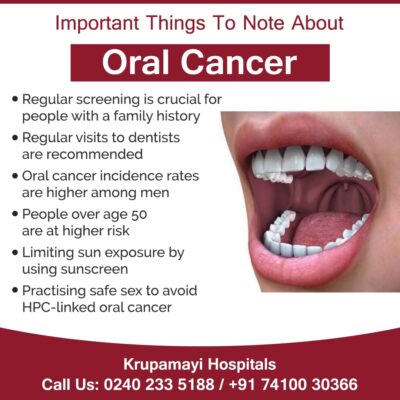When cells alter (mutate) and expand out of control, cancer develops. The aberrant (changed) cells frequently develop to create a lump or mass known as a tumour. Cancer cells can also infiltrate (grow) into neighbouring locations. They have the potential to spread to other sections of the body as well. This is referred to as metastasis.
Oral cancer is a type of cancer that begins in the cells that line the inside of the mouth and lips. Oral cancer is a rather prevalent condition. It can be healed if found and treated early enough (when it’s little and hasn’t spread). Because the mouth and lips are easy to inspect, a healthcare physician or dentist can typically detect oral cancer in its early stages.
Squamous cell carcinoma is the most frequent type of oral cancer. Other, considerably less common varieties exist.
Who is at risk of developing oral cancer?
Anything that increases your chances of developing an illness is referred to as a risk factor. It’s possible that the cause of someone’s cancer is unknown. Risk factors, on the other hand, can increase a person’s chances of developing cancer. Some risk factors may be beyond your control. Others, on the other hand, may be something you can alter.
Men are twice as likely as women to have oral cancer. Risk is also increased by the following factors:
- Tobacco use in the past or present.
- Consuming a lot of alcohol
- Fair skin
- A lot of time in the sun rays
- Fruits and vegetables are in short supply in your diet.
- Infection with the human papillomavirus (HPV)
- Some genetic diseases, such as Fanconi anemia, can be passed down through generations.
- Chronic mouth irritation, such as from improperly fitted dentures
- Using chewing tobacco products such as betel quid or gutka
- Immune system dysfunction
Consult your Cancer Doctor in Aurangabad about your mouth cancer risk factors and what you can do to reduce them. Dr. Viraj Borgaonkar is One of the Best Onco Surgeon in Aurangabad.
Is it possible to prevent oral cancer?
There is no guarantee that all mouth and throat cancers can be avoided. However, there are some risk factors that you may alter to help lower your risk:
- Stop using all tobacco products.
- Keep your distance from other people’s cigarette smoke (secondhand smoke)
- Alcohol should only be consumed in small amounts or not at all.
- HPV infection can be avoided.
- Protect yourself from the sun’s UV rays.
- Have your dentures fitted properly?
- Consume a variety of fruits and vegetables.
- Take good care of your teeth and mouth.
What are the signs and symptoms of oral cancer?
Oral cancer is frequently discovered when someone detects changes in their mouth. The following are some of the signs and symptoms of oral cancer:
- An unhealed sore on your lip or in your mouth
- A lump on your lip, in your mouth, or in your throat is a sign that something is wrong.
- Having difficulty eating or swallowing
- Bleeding, discomfort, or numbness in your mouth that isn’t natural
- You have a feeling that something is stuck in your throat.
- A white or red area on the gums, tongue, or lining of your mouth
- Numbness in your tongue or mouth
- If you have a lump, swelling, or mass in your neck that won’t go away, consult your doctor.
- When you chew or swallow, you may experience pain.
- Swelling around your jaw
- Teeth that are loose or unpleasant
- Unexpected weight loss
- A shift in your tone of speech
- Experiencing ear or jaw pain?
Many of these could be the result of other health issues. However, if you have these symptoms, you should see Best Cancer Hospital in Aurangabad. Only a medical professional can determine whether or not you have cancer.
What is the treatment for oral cancer?
The type of oral cancer you have, the results of your tests, and the stage of cancer will all influence your treatment options. The purpose of treatment may be to cure you, control your cancer, or relieve cancer-related difficulties. At Krupamayi Cancer Hospital in Aurangabad, Discuss your treatment options, treatment goals, and potential risks and side effects with our healthcare team. Other considerations include whether cancer can be removed through surgery, how your body will seem and function following treatment, and your overall health.
There are two types of cancer treatments: local and systemic. Local treatments target a specific location to remove, eliminate, or control cancer cells. Local therapies include surgery and radiation. Oral cancer is commonly treated with surgery. Systemic therapy is used to kill or control cancer cells that have spread throughout your body. Chemotherapy, immunotherapy, and Targeted therapy are all considered systemic treatments when taken by pill or injection. You may receive a single treatment or a series of treatments. All these treatments available ka krupamayi Cancer Hospital Aurangabad.
Oral cancer can be treated using a variety of methods, including:
- Surgery
- Chemotherapy
- Radiation therapy
- Targeted therapy
- Immunotherapy
- Supportive care
Discuss your treatment choices with Our best onco surgeon in Aurangabad. Make a list of questions that you’d like to ask. Consider the advantages and disadvantages of each option. Before making a decision, discuss your concerns with your healthcare professional.
When should you make contact with Our Cancer Specialist?
Your Cancer Doctor will talk with you Regarding when to call. You may be told to call if you have any of the below:
- New symptoms or worsening symptoms
- Fever and other symptoms of infection
- Treatment side effects that interfere with your everyday activities or do not improve with treatment.
Inquire with your healthcare provider about the warning signs to look out for and when to get help. Know where to go for aid after hours, on weekends, and on holidays.


